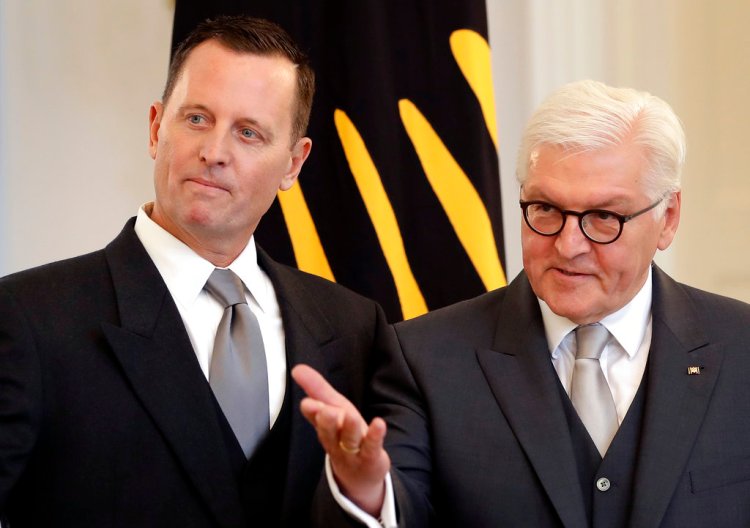BERLIN — For the past year, German officials have been urging their U.S. counterparts to send a new ambassador to Berlin. But after finally receiving one, many may be having second thoughts.
Within hours of assuming his new post on Tuesday, Richard Grenell triggered harsh criticism in this Trump-weary country after appearing to threaten one of the American president’s frequent targets: German businesses.
In a tweet following President Trump’s announcement to leave the Iran nuclear deal, Grenell wrote that “German companies doing business in Iran should wind down operations immediately.” Germany, alongside France and Britain, wants to stick to the deal Trump is seeking to scrap. And while Grenell’s post may not deviate from the official White House stance on future European business dealings with Iran, the timing and tone struck German politicians, journalists and businessmen as offensive and inappropriate.
The remarks, which were widely perceived as a threat here, came only an hour after the U.S. Embassy in Berlin took to Twitter to announce that Grenell had now officially arrived in the German capital.
While German President Frank-Walter Steinmeier may have kindly welcomed the new U.S. top diplomat in the German capital, business associations and leading politicians immediately lashed out at him on his first day.
“It’s not my task to teach people about the fine art of diplomacy, especially not the U.S. ambassador. But he does appear to need some tutoring,” said Andrea Nahles, the leader of Germany’s mainstream Social Democratic party, striking a sarcastic tone. The Social Democrats are part of Chancellor Angela Merkel’s government and are in charge of key responsibilities, including the Foreign Ministry.
“Germans are eager to listen, but they will resent instructions,” wrote Wolfgang Ischinger, the chairman of the Munich Security Conference and an authority on transatlantic ties, responding directly to Grenell on Twitter.
Businessmen – who already felt unfairly targeted by Trump’s Twitter attacks and his tariff threats – didn’t hold back their criticism, either.
“I’m sure that our foreign ministry will indicate to the ambassador that it’s not his role to give direction or utter threats to German companies,” said Michael Tockuss, chairman of the German-Iranian Chamber of Commerce.
The deal between Iran, the United States and several other countries lifted crippling sanctions on Iran in exchange for halting of its nuclear program.
Following the signing, Iranian exports to the European Union increased by 375 percent from 2015 to 2016. European companies have already invested a significant amount of money in the country, raising the stakes if the deal should collapse. German companies that depend disproportionately on exports would be most affected by the deal’s disintegration.
While Grenell’s Tuesday tweet may have struck Germans as offensive, some businesses said they would likely respect the measures. European plane-maker Airbus, for instance, announced that it would adhere to U.S. sanctions on Iran, but added that it was still determining the full impact.
Grenell defended his tweet on Wednesday, writing that he had used “the exact language sent out from the White House talking points & fact sheet.” Some German media outlets have acknowledged the openly gay diplomat’s experience as a spokesman for the U.S. mission to the United Nations during the George W. Bush administration, but his career as a Fox News Channel commentator and early defender of Trump has drawn ire.
If responses to Grenell’s Twitter defense on Wednesday offer any indication, the new U.S. ambassador to Germany will be up to a difficult task in Berlin.
“That language is not going to further your cause. If anything, it will do the opposite. Good luck with the new job,” Marcel Dirsus, a German political scientist focusing on defense issues, responded to Grenell on Twitter.
Evening news anchor Christian Sievers appeared similarly unconvinced whether Grenell’s approach would work in Berlin: “Is that some sort of apology from America’s (pretty undiplomatic) top diplomat in Germany?”
Wednesday’s unusually harsh criticism of an incoming U.S. ambassador to Germany also reflects how much transatlantic relations have soured since Trump’s inauguration. In responding to the president’s comments or actions, German top government officials have begun to go without the usual diplomatic phrases and are choosing to express open opposition. Merkel has previously warned that the collapse of the Iran deal could widen the divide between the United States and Europe.
Grenell’s tweet was reminiscent of the awkward start of the U.S. ambassador to the Netherlands, Pete Hoekstra, last December, after a reporter asked him why he said there were “no go” areas in the country, where radical Muslims are setting cars and politicians on fire. Hoekstra initially denied having made such comments, and called the claim “fake news.” After realizing that there was video footage making those claims, he denied having used the term “fake news” just seconds before.
Making unfortunate remarks disappear on Twitter may just be as difficult.
Copy the Story LinkSend questions/comments to the editors.



Success. Please wait for the page to reload. If the page does not reload within 5 seconds, please refresh the page.
Enter your email and password to access comments.
Hi, to comment on stories you must . This profile is in addition to your subscription and website login.
Already have a commenting profile? .
Invalid username/password.
Please check your email to confirm and complete your registration.
Only subscribers are eligible to post comments. Please subscribe or login first for digital access. Here’s why.
Use the form below to reset your password. When you've submitted your account email, we will send an email with a reset code.